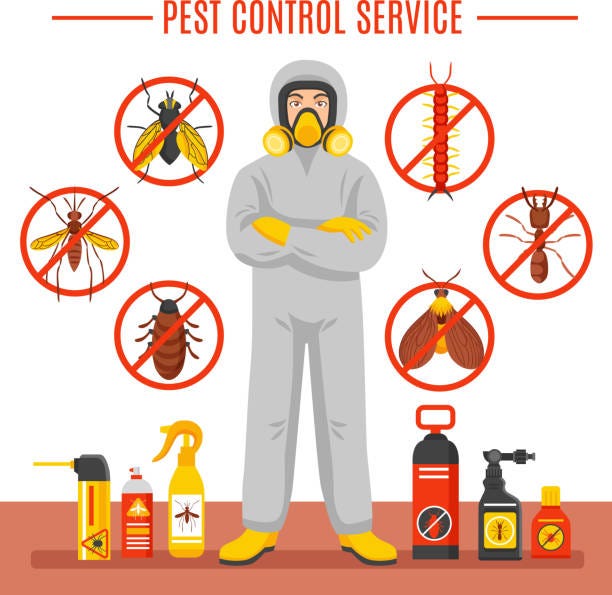Efficient Parasite Control Services: An Extensive Consider Elimination Techniques and Avoidance Actions
In the world of pest control services, the effective administration of problems needs a careful strategy that combines different techniques and actions for both elimination and prevention. From Integrated Parasite Administration (IPM) techniques that prioritize lasting services to chemical extermination strategies created for targeted elimination, the collection against parasites is complex and large.

Integrated Parasite Monitoring (IPM) Approaches
Integrated Insect Administration (IPM) Strategies encompass a detailed strategy to pest control that focuses on monitoring, prevention, and control methods to successfully take care of parasite populations. By integrating various methods, IPM aims to lessen the influence of parasites while additionally reducing the reliance on chemical pesticides. Prevention lies at the core of IPM, emphasizing methods like appropriate cleanliness, maintenance of hygiene, and sealing entry points to discourage insects from infesting buildings.
Chemical Elimination Methods
Chemical extermination methods are typically utilized in insect control services to efficiently eliminate insect populations that position a risk to human health and property. These techniques involve using numerous chemical compounds particularly developed to target and eliminate insects such as insects, rats, and various other unwanted creatures. The application of pesticides, pesticides, rodenticides, and various other chemical representatives is meticulously managed to make sure maximum effectiveness while decreasing dangers to humans, pets, and the setting.
Among the key benefits of chemical extermination strategies is their ability to offer quick and targeted results, making them specifically helpful in cases of extreme invasions or urgent bug control needs - a1 portland bed bug exterminator. However, it is important to highlight the importance of appropriate handling, application, and disposal of these chemical products to avoid unintended damage
Furthermore, incorporated pest administration (IPM) approaches typically combine chemical extermination strategies with other techniques such as hygiene, habitat adjustment, and organic controls to create a sustainable and detailed pest control technique. By including chemical extermination techniques carefully within an IPM structure, pest control services can successfully manage insect populations while decreasing potential risks to human health and wellness and the setting.
Organic Insect Control Methods
Utilizing all-natural killers and bloodsuckers to take care of pest populations is a sustainable technique understood as organic parasite control. This strategy harnesses the natural mechanisms of the community to control bug populaces without counting on artificial chemicals. One usual organic control approach entails presenting all-natural adversaries of the target parasite varieties, such as ladybugs for aphid control or nematodes for termite problems. These all-natural killers eat the bugs, assisting to keep their populations in check.
Another reliable organic control method is the use of microbial insecticides. These are naturally taking place microbes, such as viruses, fungis, and germs, that specifically target and infect certain bug varieties. By making use of these microbial representatives, pest populaces can be effectively reduced without causing or harming valuable microorganisms harm to the environment.
Physical Parasite Prevention Actions
Applying physical parasite avoidance actions entails making use of obstacles and architectural modifications to deter parasites from infesting a home or going into. Setting up door sweeps, screens on home windows, and securing fractures in the foundation can aid protect against parasites like bugs and rodents from gaining gain access to indoors.
Another physical avoidance action is making use of barriers like fencing to maintain larger pests such as deer or raccoons far from the building. Mounting mesh or cable screens around yards can safeguard plants from being harmed by bugs. Proper waste monitoring, consisting of protecting trash bin with tight-fitting lids, is essential in preventing pests like rodents, pests, and raccoons. By carrying out these physical pest avoidance measures, property proprietors can considerably lower the danger of parasite infestations and the damages they can cause.
Expert Bug Assessment Treatments
Performing systematic and thorough pest inspections is a fundamental aspect of professional pest administration procedures. Professional pest assessors are educated to diligently check out properties for signs of problems, recognizing pest types, entrance points, and helpful problems. The evaluation process typically starts with a detailed evaluation of both the interior and outside of the facilities. This involves monitoring for bug droppings, nibble marks, nests, and any architectural damage that may show insect activity. In addition, examiners might make use of specific devices such as wetness meters and borescopes to spot hidden problems within walls or crawl rooms.

Verdict
In final thought, effective bug control services use a range of techniques, consisting of Integrated Pest Monitoring techniques, chemical elimination techniques, biological controls, and physical prevention measures. Expert pest assessment procedures play a a1 pest control portland bed bugs vital role in recognizing and dealing with pest concerns in a timely fashion. By executing a mix of these approaches, building owners can efficiently prevent and handle parasite infestations.
From Integrated Bug Monitoring (IPM) techniques that focus on lasting solutions to chemical extermination methods designed for targeted elimination, the collection against parasites is substantial and multifaceted.Integrated Parasite Management (IPM) Methods incorporate an extensive technique to pest control that concentrates on prevention, tracking, and control approaches to effectively manage insect populaces.Chemical elimination strategies are generally employed in pest control services to efficiently remove bug populaces that posture a threat to human health and residential or commercial property.Employing natural predators and parasites to handle bug populaces is a lasting approach recognized as organic bug control.In final thought, efficient insect control services employ a variety of strategies, consisting of Integrated Parasite Monitoring methods, chemical extermination methods, organic controls, and physical avoidance procedures.